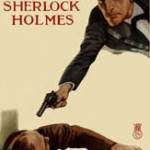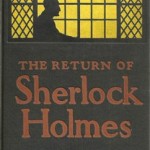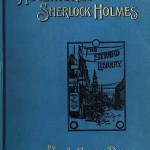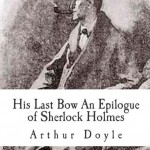“I was wondering, Watson, what on earth could be the object of this man in telling us such a rigmarole of lies. I nearly asked him so–for there are times when a brutal frontal attack is the best policy–but I judged it better to let him think he had fooled us. Here is a man with an English coat frayed at the elbow and trousers bagged at the knee with a year’s wear, and yet by this document and by his own account he is a provincial American lately landed in London. There have been no advertisements in the agony columns. You know that I miss nothing there. They are my favourite covert for putting up a bird, and I would never have overlooked such a cock pheasant as that. I never knew a Dr. Lysander Starr, of Topeka. Touch him where you would he was false. I think the fellow is really an American, but he has worn his accent smooth with years of London. What is his game, then, and what motive lies behind this preposterous search for Garridebs? It’s worth our attention, for, granting that the man is a rascal, he is certainly a complex and ingenious one. We must now find out if our other correspondent is a fraud also. Just ring him up, Watson.”
I did so, and heard a thin, quavering voice at the other end of the line.
“Yes, yes, I am Mr. Nathan Garrideb. Is Mr. Holmes there? I should very much like to have a word with Mr. Holmes.”
My friend took the instrument and I heard the usual syncopated dialogue.
“Yes, he has been here. I understand that you don’t know him…. How long? … Only two days! … Yes, yes, of course, it is a most captivating prospect. Will you be at home this evening? I suppose your namesake will not be there? . . . Very good, we will come then, for I would rather have a chat without him…. Dr. Watson will come with me…. I understand from your note that you did not go out often…. Well, we shall be round about six. You need not mention it to the American lawyer…. Very good. Good-bye!”
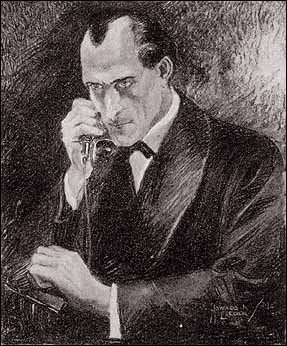
It was twilight of a lovely spring evening, and even Little Ryder Street, one of the smaller offshoots from the Edgware Road, within a stone-cast of old Tyburn Tree of evil memory, looked golden and wonderful in the slanting rays of the setting sun. The particular house to which we were directed was a large, old-fashioned, Early Georgian edifice, with a flat brick face broken only by two deep bay windows on the ground floor. It was on this ground floor that our client lived, and, indeed, the low windows proved to be the front of the huge room in which he spent his waking hours. Holmes pointed as we passed to the small brass plate which bore the curious name.
“Up some years, Watson,” he remarked, indicating its discoloured surface. “It’s his real name, anyhow, and that is something to note.”
The house had a common stair, and there were a number of names painted in the hall, some indicating offices and some private chambers. It was not a collection of residential flats, but rather the abode of Bohemian bachelors. Our client opened the door for us himself and apologized by saying that the woman in charge left at four o’clock. Mr. Nathan Garrideb proved to be a very tall, loosejointed, round-backed person, gaunt and bald, some sixty-odd years of age. He had a cadaverous face, with the dull dead skin of a man to whom exercise was unknown. Large round spectacles and a small projecting goat’s beard combined with his stooping attitude to give him an expression of peering curiosity. The general effect, however, was amiable, though eccentric.
The room was as curious as its occupant. It looked like a small museum. It was both broad and deep, with cupboards and cabinets all round, crowded with specimens, geological and anatomical. Cases of butterflies and moths flanked each side of the entrance. A large table in the centre was littered with all sorts of debris, while the tall brass tube of a powerful microscope bristled up among them. As I glanced round I was surprised at the universality of the man’s interests. Here was a case of ancient coins. There was a cabinet of flint instruments. Behind his central table was a large cupboard of fossil bones. Above was a line of plaster skulls with such names as “Neanderthal,” “Heidelberg,” “Cro-Magnon” printed beneath them. It was clear that he was a student of many subjects. As he stood in front of us now, he held a piece of chamois leather in his right hand with which he was polishing a coin.
“Syracusan–of the best period,” he explained, holding it up. “They degenerated greatly towards the end. At their best I hold them supreme, though some prefer the Alexandrian school. You will find a chair here, Mr. Holmes. Pray allow me to clear these bones. And you, sir–ah, yes, Dr. Watson–if you would have the goodness to put the Japanese vase to one side. You see round me my little interests in life. My doctor lectures me about never going out, but why should I go out when I have so much to hold me here? I can assure you that the adequate cataloguing of one of those cabinets would take me three good months.”
Holmes looked round him with curiosity.
“But do you tell me that you never go out?” he said.
“Now and again I drive down to Sotheby’s or Christie’s. Otherwise I very seldom leave my room. I am not too strong, and my researches are very absorbing. But you can imagine, Mr. Holmes, what a terrific shock –pleasant but terrific–it was for me when I heard of this unparalleled good fortune. It only needs one more Garrideb to complete the matter, and surely we can find one. I had a brother, but he is dead, and female relatives are disqualified. But there must surely be others in the world. I had heard that you handled strange cases, and that was why I sent to you. Of course, this American gentleman is quite right, and I should have taken his advice first, but I acted for the best.”
“I think you acted very wisely indeed,” said Holmes. “But are you really anxious to acquire an estate in America?”
“Certainly not, sir. Nothing would induce me to leave my collection. But this gentleman has assured me that he will buy me out as soon as we have established our claim. Five million dollars was the sum named. There are a dozen specimens in the market at the present moment which fill gaps in my collection, and which I am unable to purchase for want of a few hundred pounds. Just think what I could do with five million dollars. Why, I have the nucleus of a national collection. I shall be the Hans Sloane of my age.”

